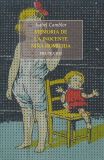New Spanish Books: The online guide of titles from Spanish publishers and literary agents with rights for translation in the UK. To consult titles available in other markets please click on the above links.
Memoria de la inocente niña homicida

23rd February, 1981. A village in Castille surrounded by mountains. Every Monday, seven-year-old Elena goes to her catechism class. One day she and her classmates are unexpectedly urged to leave the classroom and to go home as quickly as they can. A coup d'etat is happening in the country right then. On her way home a sudden, fortuitous event unwittingly determines how from that moment on she will deal with any inopportune occurrence that happens to her. Early October, 1992, Madrid. Elena is starting her university career in a halls of residence. Eleven years have gone by during which she has had to face up to life in a very different way. Now she must do so again and, much to her regret, is obliged to continue acting in a ruthless fashion.
This book attracted the attention of some our Panellists in the first meeting. This interest was shared by the rest of them after reading the report by Peter Bush. As they said, the book is an intimate chronicle of a very unusual character, and it is likely to be successful in the UK.
Despite what the novel's title might suggest A Girlish Assassin is not a roman noir. It is rather the psychological portrait of Elena, a lonely adolescent girl, who, on the one hand seems to be extremely sensitive and ingenuous and, on the other, reacts in ways that are clearly psychopathic. Elena is an ambiguous, complex chiaroscuro character. Although she is the prisoner of fantasies and hallucinations she has used to interpret the reality that surrounded her from childhood, the novel avoids establishing simple correlations of cause and effect between the events that mark out her childhood and her future behaviour. In this sense, the novel sidesteps mechanical explanations and simply accompanies the protagonist through her life; it is not judgemental but neither does it try to justify her acts. (...)
Memoir of a Girlish Murderer is a novel that is at once tender and tragic. Spanish critics have described it as a tragicomedy or journey round the dark crannies of the human mind. The author has a powerful, original voice. Her prose is concise yet lyrical and creates the protagonist's universe without any of the usual melodramatic clichés. Isabel Clambor has created a fascinating fictional character. She is not attempting to expound a 'clinical case' or discover the genesis or reasons for her protagonist's random behaviour and that is how she successfully draws the reader into a mind where lucidity and madness co-exist, if in the most disturbing ways. (...) (From the reader report by Peter Bush)
